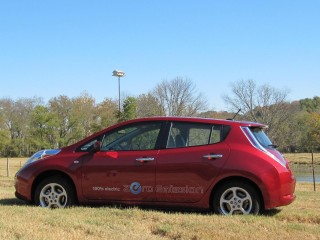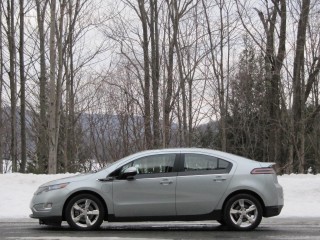 You’d hardly expect Mark Reuss, the North American President of General Motors, to be a fan of the primary rival to the company’s 2011 Chevrolet Volt.
You’d hardly expect Mark Reuss, the North American President of General Motors, to be a fan of the primary rival to the company’s 2011 Chevrolet Volt.
But in a recent interview with the Nashville Business Journal, the man responsible for starting the GM Performance Division took his dislike to a whole new level.
Reuss was so brutal we can’t help but wonder if he’s feeling just a little worried about the Volt’s Japanese rival. He called the Leaf a “single purpose” car and said he wouldn’t even rely on it to get his children to and from high school safely. And he went on to slam both theNissan Leaf and its 73-mile range.
The 2011 Leaf “has a finite range and requires infrastructure and charging to run it, where the Volt is really an extended-range electric vehicle,” Reuss said.
“The Volt can really be the only car you own. You better be living within a certain range for the Leaf. It’s a lot different market, a lot different car, and a completely different driver.”
Range anxiety? Limited range? Impossible to charge? These claims are hardly new. In fact, they sound eerily similar to the early the Volt marketing material. But Reuss went one step further, calling into question the 2011 Nissan Leaf’s 73-mile EPA rated range and its lack of a gasoline generator to provide backup electric current.
 “I’m not sure if I’d put the Leaf in the hands of my three kids,” Reuss jibed. “Say, what if they can’t charge it? What if they get to school and can’t charge it?”
“I’m not sure if I’d put the Leaf in the hands of my three kids,” Reuss jibed. “Say, what if they can’t charge it? What if they get to school and can’t charge it?”
Either Reuss can’t charge at home, or his kids have one very, very long commute to school and back. In fact, we can’t think of a single teenage kid in the Greater Detroit area who lives more than 35 miles from school. But then, we can’t think of very many parents that would drop the $32,750 price of a 2011 Leaf on a car for their inexperienced teen drivers to drive to school. Perhaps highly-paid GM executives are different, though.
This outlandish example of school commutes, combined with recent sales figures, make us wonder if Reuss is scared of the Volt’s unlikely competitor.
Reuss told the Nashville Business Journal that the Volt and Leaf weren’t really rivals, and we’d have to agree. In a conventional market, the two cars are very different. But in the fledgling market of plug-in vehicles is hardly typical, and it turns the two cars into bitter rivals, simply because they’re the only two mainstream electric cars you can go to a dealer and purchase today.
 In fact, since both cars launched last December, sales figures have been scrutinized over and over. Last month, for the first time since its launch, the Leaf sales figures topped those of the Volt–despite Nissan’s tardy rollout schedule, a devastating earthquake, and subsequent supply-chain problems.
In fact, since both cars launched last December, sales figures have been scrutinized over and over. Last month, for the first time since its launch, the Leaf sales figures topped those of the Volt–despite Nissan’s tardy rollout schedule, a devastating earthquake, and subsequent supply-chain problems.
Is Reuss feeling a little anxious by Nissan’s gain in popularity? Or perhaps he’s just indulging in the annoying but longstanding Detroit habit of trash-talking?
Written by Nikki Gordon-Bloomfield, this article originally appeared on All Cars Electric, one of VentureBeat’s editorial partners.

